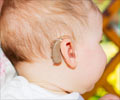Iron deficiency anemia is prevalent in those with hearing loss due to damage in the outer ear, middle ear and hearing loss due to malfunction of the cochlea.

- Diagnosing and treating iron deficiency anemia may positively affect the overall health status of adults with hearing loss.
- Understanding of the association between IDA and all types of hearing loss may help to open new possibilities for early identification and appropriate treatment.
In 2014, approximately 15 percent of adults reported difficulty with hearing. Because IDA is a common and easily correctable condition, further understanding of the association between IDA and all types of hearing loss may help to open new possibilities for early identification and appropriate treatment.
Depending on which part of the hearing system is affected, hearing loss is categorised as conductive, sensorineural or a mixture of both. Conductive hearing loss is caused by blockage or damage in the outer ear, middle ear or both. It leads to a loss of loudness.
Some of the causes of a conductive hearing loss include ear infections, perforated eardrum or blockage of the ear canal by wax or foreign objects. The degree of a conductive hearing loss varies, but you cannot go completely deaf. A conductive hearing loss can often be treated by medical or surgical means.
Sensorineural hearing loss is a result of damage to, or a malfunction of, the cochlea (the sensory part) or the hearing nerve (the neural part). It results in a loss of loudness as well as a lack of clarity. It can be caused by the ageing process, excessive noise exposure, diseases such as meningitis or Meniere’s disease, and viruses such as mumps or measles. There is rarely any medical treatment for sensorineural hearing loss, so it is permanent and hearing devices are often recommended.
Both sensorineural hearing loss present in 1.1 percent of individuals with IDA and combined hearing loss present in 3.4 percent were significantly associated with IDA. Analysis confirmed increased odds of SNHL and combined hearing loss among adults with IDA.
Reference
- Kathleen M. Schieffer et al., Iron deficiency anemia associated with hearing loss, JAMA Otolaryngology - Head & Neck Surgery (2016).
- http://www.hopkinsmedicine.org/otolaryngology/specialty_areas/hearing/hearing-loss/types-of-hearing-loss.html.
Source-Medindia















